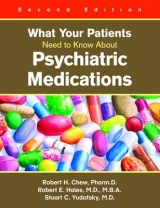
What Your Patients Need to Know About Psychiatric Medications
American Psychiatric Press Inc. (Verlag)
978-1-58562-203-0 (ISBN)
- Titel ist leider vergriffen;
keine Neuauflage - Artikel merken
The groundbreaking What Your Patients Need to Know About Psychiatric Medications provides practical-and essential-information for psychiatric patients and patients and their families in the form of easy-to-understand individualized medication sheets on all currently prescribed psychiatric medications. Introductory sections of What Your Patients Need to Know About Psychiatric Medications details the key information presented on each medication sheet, as well as web sites, recommended reading, and a discussion of psychiatric medications in pregnancy. Subsequent chapters comprise the actual psychiatric medication sheets, whichAdue to their clear format and styleAare both easy to understand and easy to translate into different languages, including Spanish.
Each medication sheet lists the brand name, generic name, available strengths, generic form availability, and medication class and then discusses general information, dosing information, side effects, precautions, use during pregnancy and breastfeeding, possible medication interactions, overdose, treatment considerations, warnings, and general advice for anti-anxiety medications, medications for insomnia, antidepressants, monoamine oxidase inhibitors, mood stabilizers, antipsychotics, stimulants, and cognitive enhancers for treatment of Alzheimer's disease and dementia.
Written by three psychiatric professionals with many decades of combined experience, What Your Patients Need to Know About Psychiatric Medications is designed to overcome barriers (such as anxiety, the Awhite coat effectA) to optimal psychopharmacological treatment, complement the work of the treating clinician, and enhance patients' understanding of and motivation to comply with cliniciansA treatment recommendations by -Providing relevant, easy-to-use, and easy-to-understand information about psychiatric medications -Answering the most common questions that patients have about their psychiatric medications, including how to take their medications and what the beneficial effects and the potential side effects are -Emphasizing clarity, accuracy, and accessibility of the information offered -Prioritizing information that is evidence-based and enhances the safe and effective use of psychiatric medications Densely informative, accurate, and up to date, What Your Patients Need to Know About Psychiatric Medications is destined to become a classic: clinical psychiatrists will feel comfortable AprescribingA this book, patient advocacy groups and county or state mental health organizations will find it useful when standardizing informed consent for psychiatric medications, and patients and their families will welcome its user-friendly presentation of complex material.
Robert E. Hales, M.D., M.B.A., is Joe P. Tupin Professor and Chair, Department of Psychiatry and Behavioral Sciences, University of California, Davis School of Medicine, and Medical Director of Sacramento County Mental Health Services in Sacramento, California. Stuart C. Yudofsky, M.D., is the D.C. and Irene Ellwood Professor and Chairman of the Department of Psychiatry and Behavioral Sciences at Baylor College of Medicine. He is also Chief of the Psychiatry Service at The Methodist Hospital in Houston, Texas. Robert H. Chew, Pharm.D., is a Psychiatric-Pharmacist Specialist at Sacramento County Mental Health Treatment Center in Sacramento, California.
Introduction. Instructions on how to use this book. Medications in pregnancy. Anti-Anxiety Medications. Overview. Ativan (lorazepam). Librium (chlordiazepoxide). Klonopin (clonazepam). Serax (oxazepam). Tranxene (clorazepate). Valium (diazepam). Xanax (alprazolam). BuSpar (buspirone). Medications for Treatment of Insomnia. Overview. Dalmane (flurazepam). Halcion (triazolam). ProSom (estazolam). Restoril (temazepam). Ambien (zolpidem). Sonata (zaleplon). Trazodone (Desyrel). Antidepressants: Selective Serotonin Reuptake Inhibitors and Other Antidepressants. Overview. Celexa (citalopram). Lexapro (escitalopram). Luvox (fluvoxamine). Paxil/Paxil-CR (paroxetine). Prozac/Prozac Weekly/Sarafem (fluoxetine). Zoloft (sertraline). Cymbalta (duloxetine). Effexor/Effexor XR (venlafaxine). Remeron (mirtazapine). Wellbutrin/Wellbutrin-SR/Wellbutrin-XL (bupropion). Tricyclic and Tetracyclic Antidepressants. Overview. Anafranil (clomipramine). Elavil (amitriptyline). Norpramin (desipramine). Pamelor (nortriptyline). Sinequan (doxepin). Tofranil/Tofranil PM (imipramine). Monoamine Oxidase Inhibitors. Overview. Mood Stabilizers. Overview. Carbatrol/Tegretol/Tegretol-XR (carbamazepine). Depakene/Depakote/Depakote-ER (divalproex sodium). Lithium (Eskalith, Eskalith-CR, Lithobid, Lithotab). Lamictal (lamotrigine). Neurontin (gabapentin). Topamax (topiramate). Trileptal (oxcarbazepine). First-Generation Antipsychotics. Overview. Haldol/Haldol Decanoate (haloperidol). Loxitane (loxapine). Mellaril (thioridazine). Navane (thiothixene). Orap (pimozide). Prolixin/Prolixin Decanoate (fluphenazine). Stelazine (trifluoperazine). Thorazine (chlorpromazine). Trilafon (perphenazine). Second-Generation Antipsychotics. Overview. Abilify (aripiprazole). Clozaril (clozapine). Geodon (ziprasidone). Risperdal/Risperdal M-Tab/Risperdal Consta (risperidone). Seroquel (quetiapine). Symbyax (Zyprexa [olanzapine] and Prozac [fluoxetine] combination) Zyprexa/Zyprexa Zydis (olanzapine). Treatment of Attention-Deficit/Hyperactivity Disorder. Overview. Stimulants. Overview. Adderall/Adderall-XR (amphetamine mixture). Concerta (methylphenidate, controlled release). Dexedrine/Dexedrine Spansules (dextroamphetamine). Focalin (dexmethylphenidate). Metadate-ER, Metadate-CD (methylphenidate, extended release). Ritalin/Ritalin-SR/Ritalin-LA (methylphenidate). Strattera (atomoxetine). Cognitive Enhancers for Treatment of Alzheimer's Disease and Other Forms of Dementia. Overview. Aricept (donepezil). Cognex (tacrine). Exelon (rivastigmine). Namenda (memantine). Reminyl (galantamine). Index.
| Erscheint lt. Verlag | 1.5.2005 |
|---|---|
| Verlagsort | VA |
| Sprache | englisch |
| Maße | 216 x 216 mm |
| Themenwelt | Sachbuch/Ratgeber ► Gesundheit / Leben / Psychologie |
| ISBN-10 | 1-58562-203-6 / 1585622036 |
| ISBN-13 | 978-1-58562-203-0 / 9781585622030 |
| Zustand | Neuware |
| Informationen gemäß Produktsicherheitsverordnung (GPSR) | |
| Haben Sie eine Frage zum Produkt? |
aus dem Bereich



